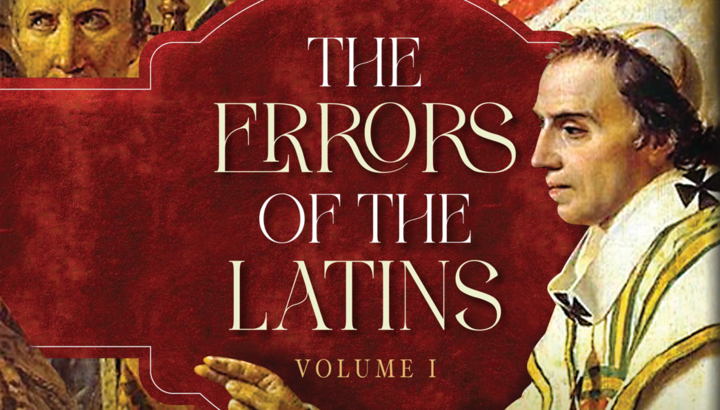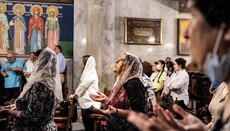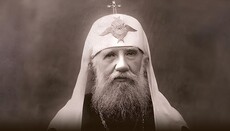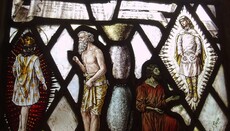REVIEW: The Errors of the Latins

Thomas Aquinas’s Contra Errores Graecorum, built on forged sources, faltered in its bid to reconcile East and West. George Pachymeres’s The Errors of the Latins masterfully defends Orthodoxy, exposing Catholic innovations with scholarly rigor. It is an invaluable resource for those inquiring into Orthodoxy, as well as those resisting the siren-song of ecumenism.
In the thirteenth century, Thomas Aquinas wrote Contra Errores Graecorum, at the request of Pope Urban IV. It aimed to address perceived theological errors in the Orthodox Church and pave the way for reunion between East and West. Aquinas crafted a rigorous defense of Latin doctrines like the Filioque and papal primacy, relying on a collection of texts compiled by Nicholas of Crotone. His work was a sincere attempt to bridge the schism, using reason and patristic authority to argue Rome’s case. However, later scholarship revealed a critical flaw: approximately 80 percent of the “Greek” documents Aquinas cited were forgeries, mistranslations, or fabrications, undermining the foundation of his argument. His effort, while intellectually impressive, rested on unreliable sources, limiting its effectiveness.
In stark contrast, George Pachymeres’s The Errors of the Latins, recently published in English by Uncut Mountain Press, stands as a masterful response from the Orthodox perspective. Published in two substantial volumes, the book is a testament to Uncut Mountain Press’ commitment to Orthodox scholarship, with clear translations, detailed footnotes, and a robust scholarly apparatus.
The scope of The Errors of the Latins is remarkably broad, covering key points of contention between East and West with clarity and depth. Even those who have investigated these matters deeply will be astonished by some of the evidence Pachymeres presents.
For instance, few know that in 1054 the Roman Church pronounced an anathema against the Orthodox as “prozyme heretics.” In other words, we were called heretics because we use leavened bread in the Eucharist! This is critical for three reasons.
1. Catholic scholars now admit that the use of leavened bread was normative in the first centuries, both in the East and the West.
2. Eastern Catholics (or Uniates) use leavened bread in their liturgies, with the permission—indeed, the encouragement!—of the Vatican.
3. The debate over leavened vs. unleavened bread has typically been cast as an Orthodox hangup. Catholic apologists are fond of reminding us that Patriarch Michael I of Constantinople stomped on “azymes” to show his contempt for the use of unleavened hosts.
Now, one might ask: Isn’t this just childish point-scoring? It could easily become that. Thankfully, Pachymeres never indulges that bad habit. One major aim of this book is to push back against this image that the Orthodox were the “antagonists” in the Great Schism. We’re often fed a very one-sided narrative: the bold Western intellectuals being scorned and insulted by Eastern fundamentalists. This caricature has haunted Orthodoxy for centuries. Thank God, Pachymeres is here to correct the record.
The author is to be commended especially on his robust treatment of the heresiarch, Pope Honorius I. Not only does he dive deeply into the events of Constantinople III: he also surveys the works of more than a hundred Catholic apologists relating to Honorius dating back to the Early Middle Ages. It is undoubtedly the case that generations of Latin historians “fudged” (or simply lied about) the circumstances surrounding Honorius’s anathematization.
A great deal of attention is paid (especially in the second volume) to the many forgeries which Catholic theologians have employed throughout history—forgeries which undoubtedly spurred the evolution of Rome’s highly “papalist” theology. The Donation of Constantine and Pseudo-Isidorian Decretals are addressed at great length, and in great depth. This makes for an amusing comparison to The Errors of the Greeks: where Aquinas propagated forgeries, Pachymeres tears them down.
There were one or two topics that the author touched on too briefly, in my opinion. For instance, there was very little treatment of the Stigmata. For instance, he did not raise the claim that “Padre Pio” wounded himself using acid—a claim which was believed and popularized, not by atheists or Protestants, but by Catholics! This section seems to have been added to the text almost as an afterthought. Part of me wishes that he hadn’t addressed this question at all, rather than treating it so briefly and incompletely.
Yet this is only a small quibble. It does not subtract from these books’ many, many strengths. To me, the most useful sections are those which discuss the “Latin ethos”: the many small departures from Apostolic Tradition that Rome embraced throughout the first millennium (all-celibate priesthood, clean-shaven bishops, etc.). Perhaps more than any one major issue, it was these many thousands of small innovations that, when added together, formed an unbridgeable gulf between East and West.
Reading these two works, I was reminded of something Pat. Bartholomew’s once said: "Before the convergence of dogmas, the communion of lived experiences; before the common worldview, the common path.” This is what struck me most about Pachymeres’s study. It shows that the very experience of Catholicism departs radically from the experience of Orthodoxy. This should serve as a warning to those who pursue "ecumenism" at the expense of Sacred Tradition, of theological clarity, and of objective truth itself.
What sets Pachymeres apart is his balance of firmness and charity. He doesn’t resort to polemic; instead, he builds a case with evidence and reason, aiming to clarify rather than inflame. This approach makes The Errors of the Latins a valuable resource for anyone seeking to understand the Orthodox perspective on the schism. The book’s length—over 1,200 pages total—might intimidate some readers. Still, even if one doesn’t read it from cover to cover, it remains an invaluable reference that one can pick up as needed.
Uncut Mountain Press also deserves to be commended for the quality of the book’s binding and the quality of the editing. This is far from a given in the Orthodox publishing world, but has become a hallmark of UMP’s work.
Pachymeres’s The Errors of the Latins uncovers the roots of the Great Schism with scholarly rigor, offering a lucid defense of the Orthodoxy position. It is erudite and yet uncompromising; it is faithful to the Orthodox tradition without being narrow-minded. Its depth and clarity make it a cornerstone for understanding East-West divides. No doubt it will prove an invaluable work in the renaissance of Orthodoxy in the West—which, of course, has only just begun.









